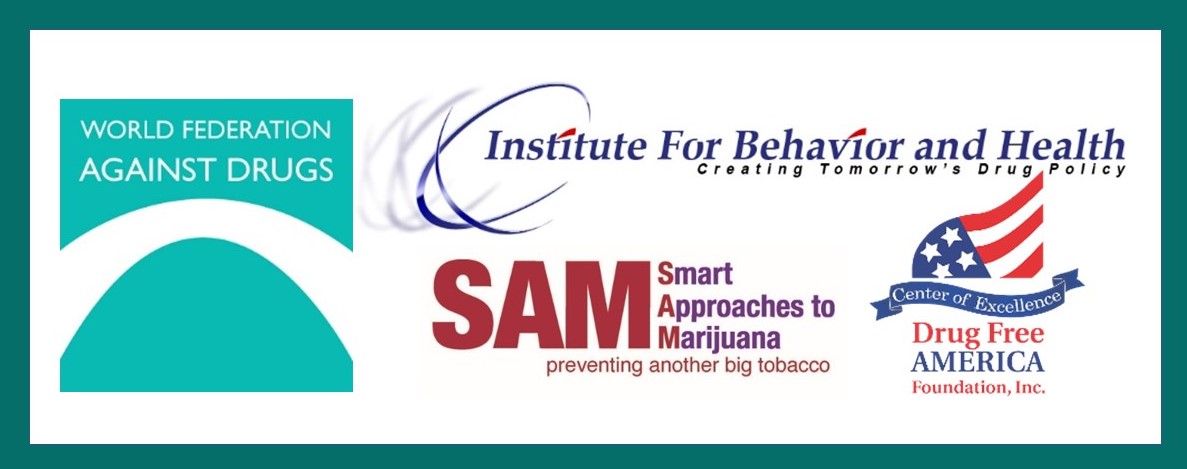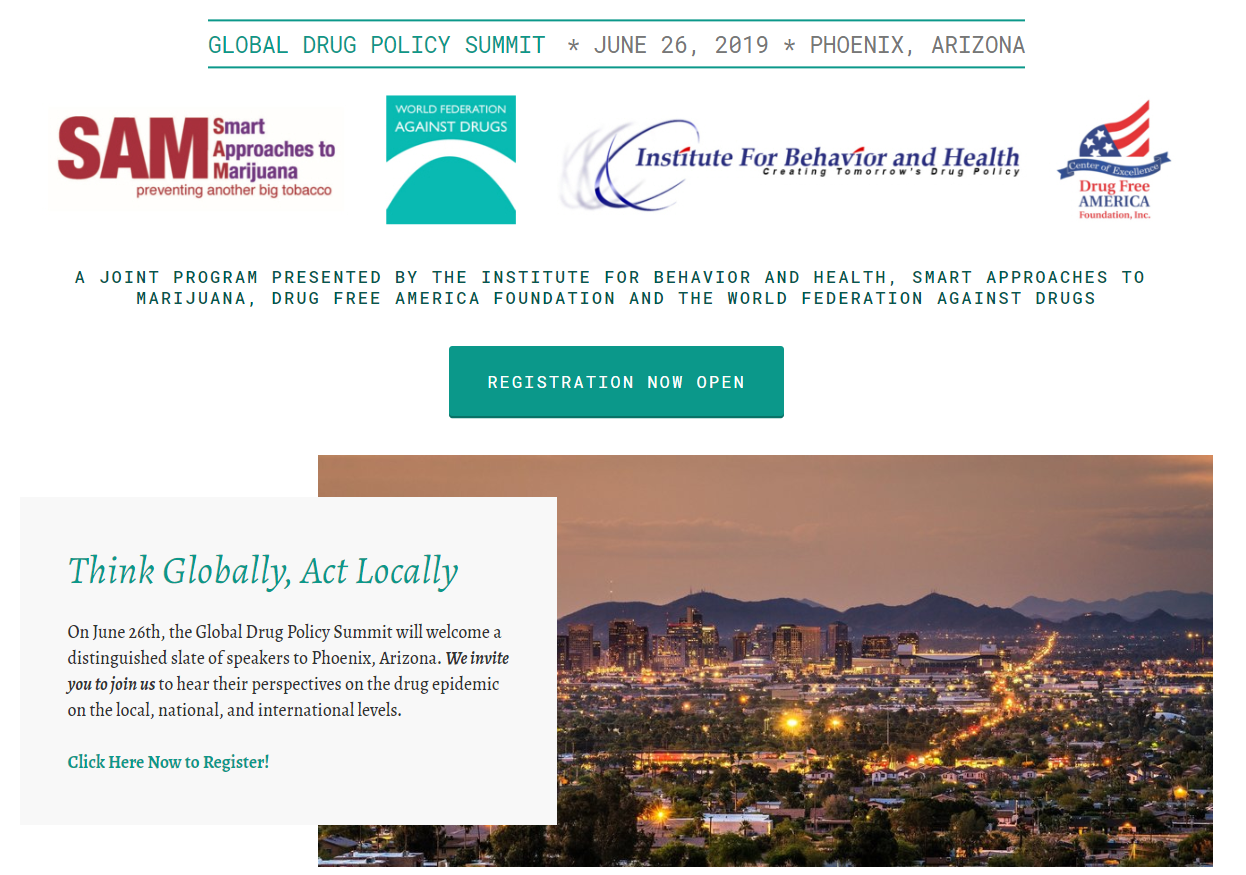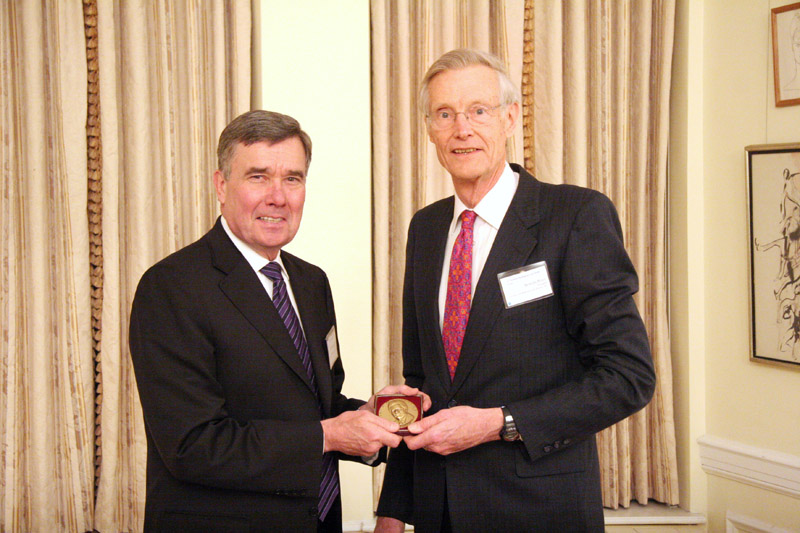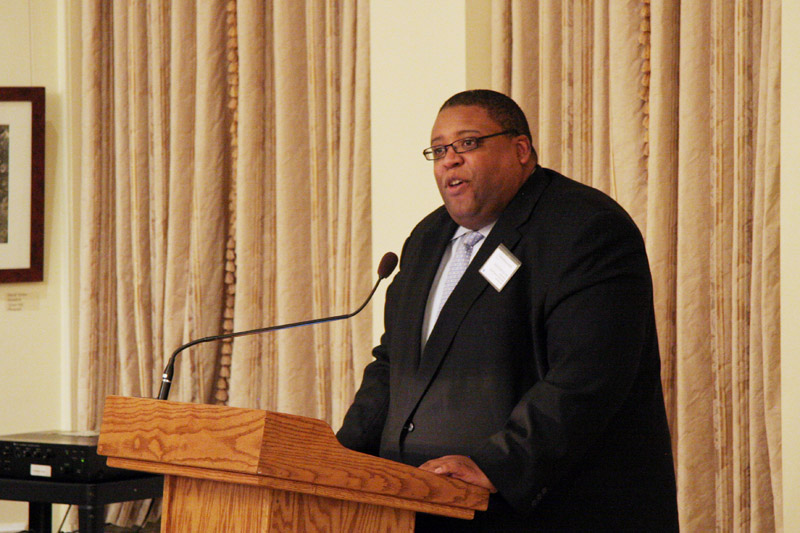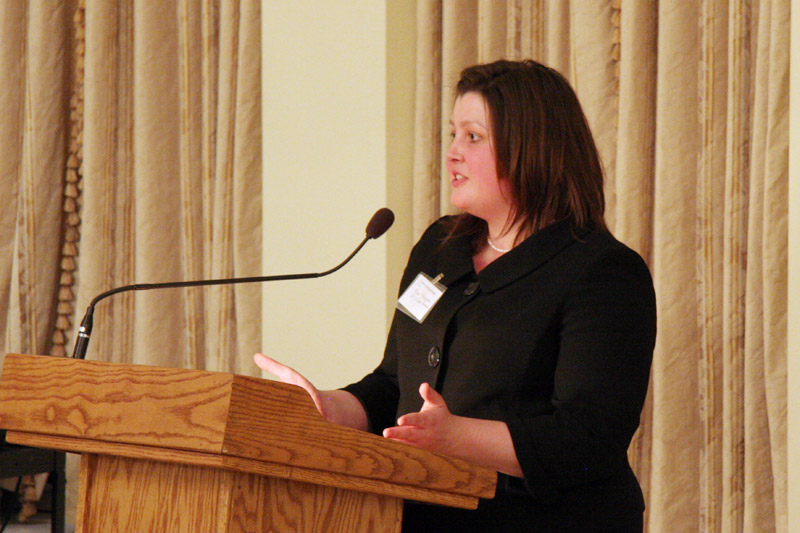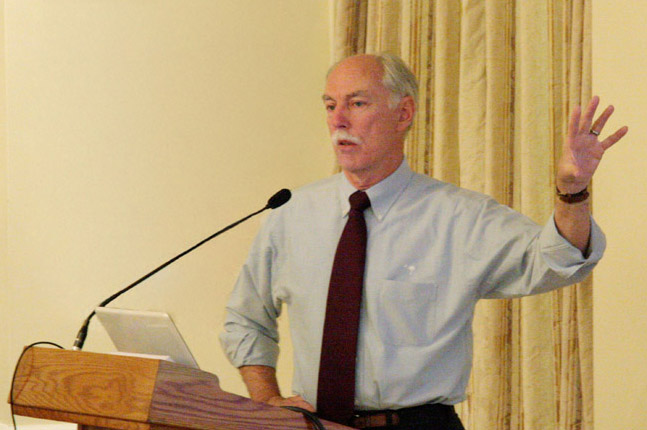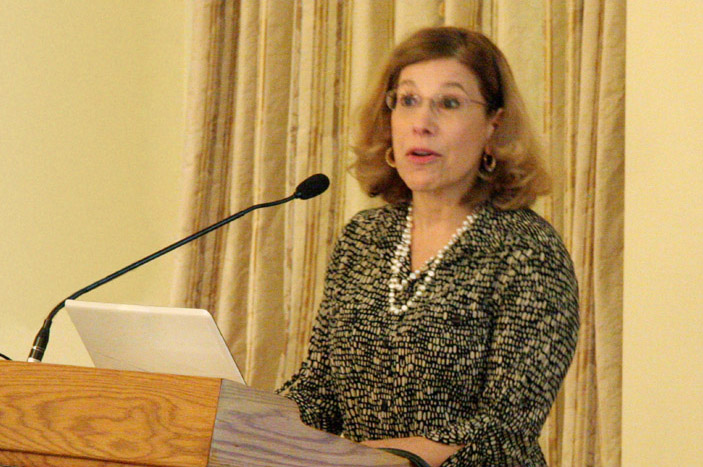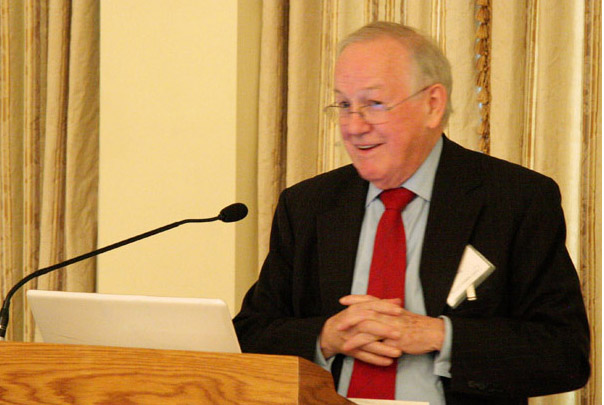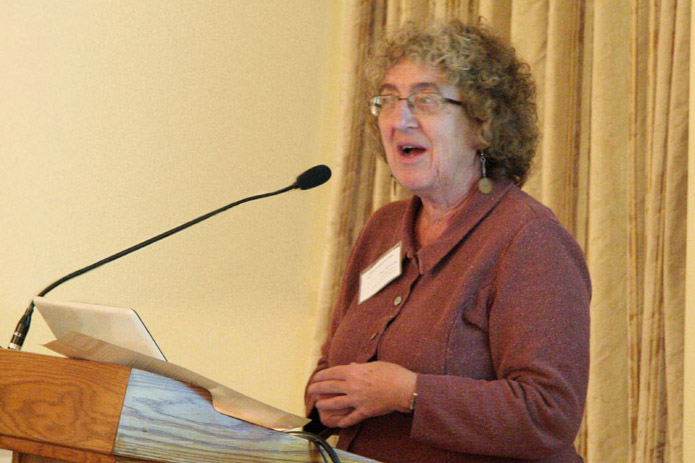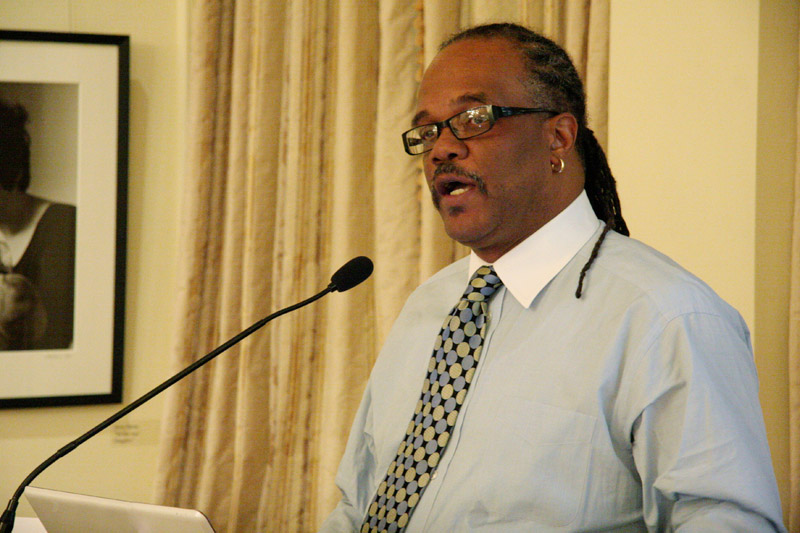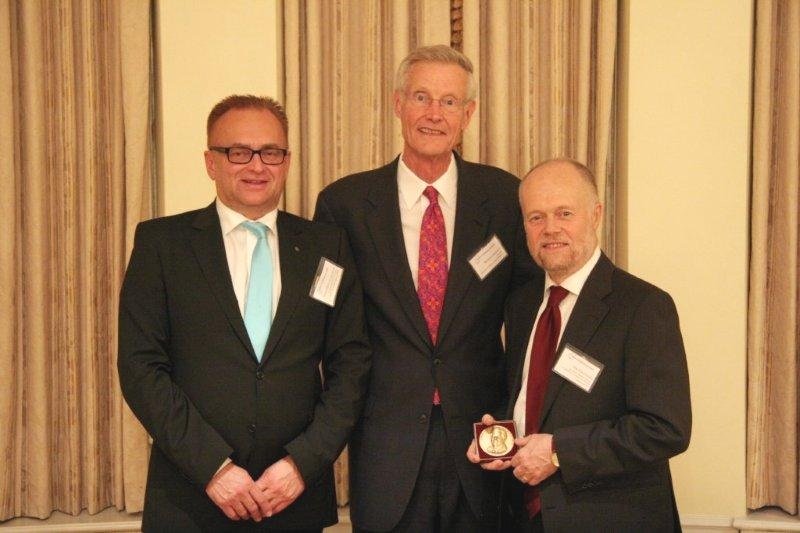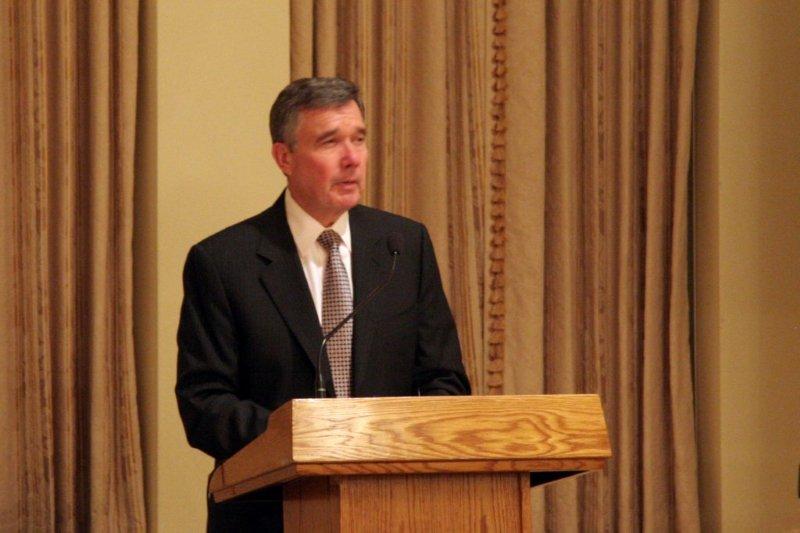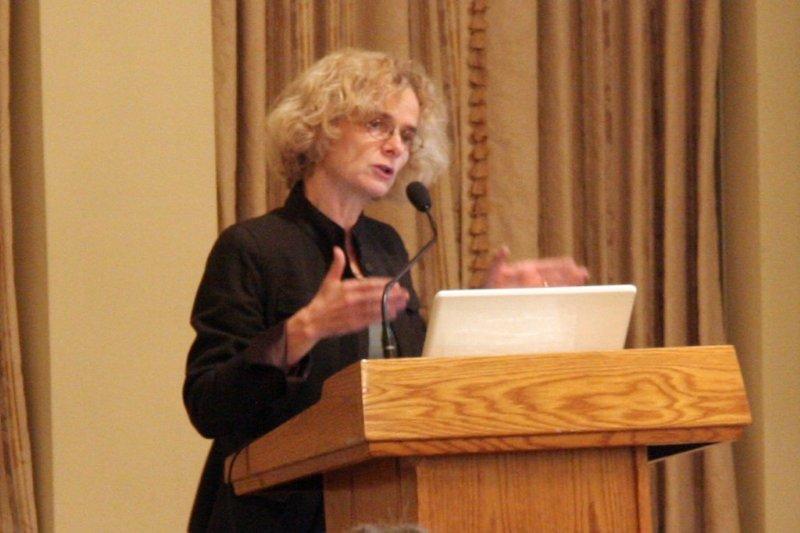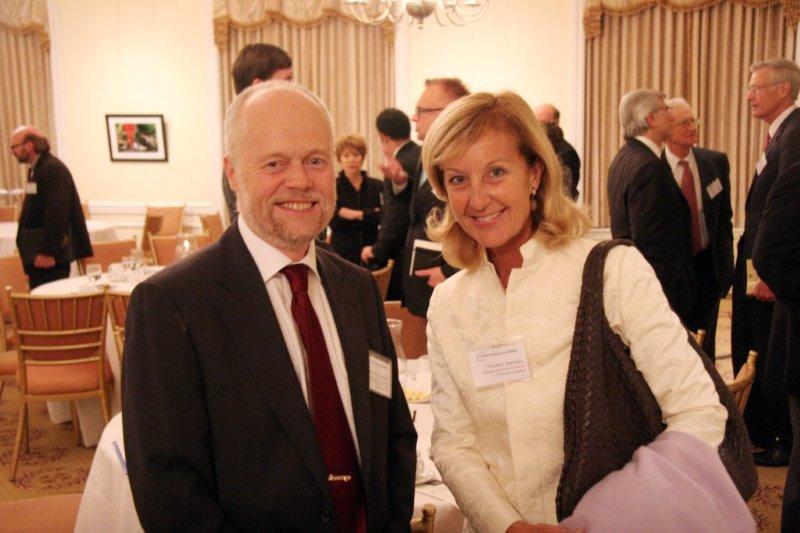Events and Special Projects
As a leader in prevention and treatment for 50 years, IBH President Robert L. DuPont, MD participates in international, national and local events to extend the organization’s work.
IBH also hosts a range of events to support its mission. The John P. McGovern Lecture Series recognizes innovations in drug abuse prevention by identifying and supporting ideas, technologies and methodologies that can be adopted in countries throughout the world. Recipients of the John P. McGovern Award are selected on the basis of their impact on drug abuse policy.
IBH hosted its first John P. McGovern Symposium in 2013. These symposia focus on specific policy issues related to the IBH mission. At each symposium, IBH convenes a working group of experts to participate in a full day of discussion, after which IBH develops a report of findings. The McGovern lectures series, awards and symposia are sponsored by the Institute for Behavior and Health, Inc. with generous support from the John P. McGovern Foundation.
August 22, 2023: Understanding the Nixon Administration’s Drug Control Policy
The Richard Nixon Library hosted a panel of leaders, including IBH President Robert L. DuPont, MD, who addressed the national drug epidemic during the Nixon Administration.
John Coleman, 33 year career officer with Federal Bureau of Narcotics, Bureau of Narcotics and Dangerous Drugs and the Drug Enforcement Administration (1965-98)
Jeffrey Donfeld, Staff Assistant, White House Domestic Council (1969-71), Assistant Director, Special Action Office for Drug Abuse Prevention (1972-73)
Dr. Robert DuPont, Founding Administrator, Narcotics Treatment Administration (1970- 73), Director, White House Special Action Office for Drug Abuse Prevention (1973-75), First Director, National Institute on Drug Abuse (1973-78)
Geoff Shepard, Moderator, White House Fellow (1969-70), Associate Director, White House Domestic Council (1970-74)
Audio begins at 3:22
April & May 2021: Combining Medications With 12-Step Model Treatment Improves OUD Outcomes
In a two-part video, IBH President Robert DuPont, MD, discusses his presentation in April 2021 at the National Rx Drug Abuse and Heroin Summit titled, “Combining Medications With 12-Step Model Treatment” that he co-presented with Marvin D. Seppala, MD, of the Hazelden Betty Ford Foundation.
Image of Dr. DuPont from a summary video filmed by the Psychiatry & Behaivoral Health Learning Network.
The continued use of medications in the absence of the nonmedical use of addictive substances is consistent with full recovery. It encourages the use of medication-assisted treatment (MAT) in abstinence-based programs where it can improve program retention and long-term outcomes… Similarly, integrating recovery support and including 12-step fellowships from the first days of treatment, can improve long-term patient outcomes in MAT.
April 14, 2021: The Pandemic and Campus Substance Use: What Colleges Need to Know Now
IBH President Robert L. DuPont, MD joined a panel of experts for a webinar hosted by the American Council of Trustees and Alumni (ACTA) to discuss research on the effects of COVID-19 on student mental health and substance use, subsequent impact on student outcomes, and strategies to promote a healthy academic environment.
Moderator: Armand Alacbay, ACTA’s VP of Trustee and Government Affairs
Robert L. DuPont, MD, President, Institute for Behavior and Health
Amelia M. Arria, PhD, professor and director, University of Maryland School of Public Health
Ellen Rome, MD, MPH, professor and head, Center for Adolescent Medicine at Cleveland Clinic Children’s
Caleb S. Boswell, LLPC, NCC, student advisor, Office of Counseling & Career Planning at Washtenaw Community College
February 24, 2021: The Problem of Driving Under the Influence of Drugs - The Views of Four Former Drug Czars
Drug-impaired driving is a threat to public health and public safety on par with the better-known problem of alcohol-impaired driving. Reducing drugged driving is a critical nonpartisan issue facing the nation -- one that remains a core priority for the Institute for Behavior and Health. IBH co-hosted a virtual event with The Heritage Foundation to bring a renewed focus on this issue with the help of former White House Drug Czars.
From left to right, in order of service as US Drug Czar: Robert L. DuPont, MD, General Barry McCaffrey, US (ret.), Gil Kerlikowske, James Carroll, Jr.
For more on the problem of drug-impaired driving, visit the IBH website, www.StopDruggedDriving.org.
January 22, 2021: One Choice for Health: A Data-Informed, Youth-Driven Prevention Message
IBH Vice President Caroline DuPont, MD presented the One Choice prevention message to a weekly parent education webinar series hosted by Johnny’s Ambassadors.
IBH analyzed national data on youth substance use behaviors and found that for young people, the use (and non-use) of all substances is closely related. Once the decision to use a substance is made, that individual is faced with many decisions about when and how much to use, with whom to use, and whether or not to use other substances.
Science supports a clear health standard for prevention of One Choice: Do not use any alcohol, nicotine, marijuana, or other drugs under age 21 for reasons of health. IBH has shown that more than ever, American youth are already making One Choice, and they are leading this new movement for youth prevention efforts across the country.
December 3, 2020: The Opioid Crisis Interview Series
The Federal Judicial Center, the research and education agency of the judicial branch of the US government, published The Opioid Crisis, a series of interviews related to the opioid misuse epidemic. The goal of this series is to provide federal judges and court personnel with information they can use in addressing one of the most destructive public health crises in our nation’s history.
Among the speakers features in the series is IBH President Robert L. DuPont, MD who shared insights from his 50+ years of experience on dealing with the issue.
The full series can be viewed online at the FJC website.
November 17, 2020: Dealing with the Addiction Crisis During the Nightmare of COVID-19
How do we deal with an addiction crisis during the nightmare of COVID? Individuals that suffer from substance use disorder (SUD) are facing even more challenges during COVID-19 as a vulnerable population that is experiencing isolation, loss of support, employment, food security, housing, transportation and safety issues. This stress and isolation have contributed to rising overdose deaths, up by as much as 42% compared to last year. Our addiction crisis is worsening during these unprecedented times and the impact to mental health is taking a toll on this population.
The National Association of Drug Court Professionals (NADCP) and Averhealth sponsored a webinar to discuss the SUD epidemic prior to the pandemic, the current landscape, and offer solutions for how we can address these issues of social isolation, economic hardships and loss of support for those suffering with SUD.
IBH President Robert L. DuPont, MD presented alongside General Barry R. McCaffrey, U.S. Army (Retired) and Bertha Madras, PhD.
The recorded webinar can be watched online via Averhealth.
October 27, 2020: Westchester NY Speaker Series - I Am One and I Make One Choice for Health
Drs. Robert and Caroline DuPont of the Institute for Behavior and Health joined Nancy Pasquale of the Rye Action for Children and Teens (RyeACT) to present the One Choice prevention message to an audience of parents of middle and high school students in the Westchester, NY Speaker Series hosted by KNOW 2 Prevent.
September 29, 2020: World Federation Against Drugs Recovery Webinar
In celebration of Recovery Month, IBH President Robert L. DuPont, MD participated in a recovery webinar hosted by the World Federation Against Drugs. Dr. DuPont reflected on his years working in the field of addiction medicine and the many lessons learned from individuals in recovery from substance use disorders.
The webinar, moderated by Mulka Nišić of Celebrate Recovery in Bosnia and Herzegovina, also featured a presentation by Huseyin Djemil, Director of Towards Recovery CIC and Green Apple Consulting Ltd in the UK.
Robert L. DuPont, MD
Photo credit: Christoffer Bergström
Huseyin Djemil
Mulka Nišić
June 28, 2019: What Do We Tell Our Children? The Health Risks and Policy Problems of Cannabis Legalization
The American Enterprise Institute (AEI) hosted author Alex Berenson to discuss his book Tell Your Children: The Truth About Marijuana, addressing the relationship between marijuana use and psychosis and violence. IBH President Robert L. DuPont, MD and Jonathan Caulkins, PhD of Carnegie Mellon University participated in a discussion moderated by AEI Resident Scholar Sally Satel, MD.
June 26, 2019: IBH Co-Hosts Global Drug Policy Summit in Phoenix, Arizona
The Global Drug Policy Summit brought together a distinguished slate of speakers presenting effective and innovative policies and practices to combat today’s drug epidemic. This one-day summit in Phoenix, Arizona was a joint program organized by the World Federation Against Drugs, Institute for Behavior and Health, Smart Approaches to Marijuana and Drug Free America Foundation.
April 18, 2019: Book Event for Tell Your Children: The Truth About Marijuana, Mental Illness, and Violence
Co-hosted by the Heritage Foundation, Smart Approaches to Marijuana (SAM) and the Institute for Behavior and Health, this event in Washington, DC presents award-winning author former New York Times reporter Alex Berenson’s recent book that reveals the link between extensive marijuana use and mental illness, as well as a hidden risk of violence linked to such use of the drug.
With marijuana use soaring, and states from coast to coast legalizing the drug, Mr. Berenson warns that cannabis legalization advocates have misled Americans about the drug's safety.
November 15, 2018: Dr. Robert DuPont Speaks to the Justice Speakers’ Institute about Prevention and Chemical Slavery
As a prison psychiatrist in the late 1960s, Dr. Robert DuPont came to understand that the rising crime at the time was directly linked to the heroin epidemic that raged in cities across America. In this conversation with the Justice Speakers’ Institute, Dr. DuPont discusses the journey from his realization to the present day national movement to end addiction. He discusses the science behind addiction and the important next steps humanity needs to take to finally end the drug epidemic.
Central to this strategy is preventing young people from ever starting to use drugs.
More on teen drug use prevention and helping teens make One Choice can be found at www.PreventTeenDrugUse.org
October 30, 2018: Book Event for Chemical Slavery: Understanding Addiction and Stopping the Drug Epidemic
IBH President Robert L. DuPont, MD presented his book Chemical Slavery at an event hosted by The Heritage Foundation in Washington, DC.
July 11, 2018: Congressional Hearing - Examining Drug-Impaired Driving
The House Energy and Commerce Committee's Subcommittee on Digital Commerce and Consumer Protection hosted a Congressional hearing that included expert witness testimony from:
Robert L. DuPont, MD, President, Institute for Behavior and Health, Inc.
Jennifer Harmon, Assistant Director, Forensic Chemistry, Orange County Crime Lab
Erin Holmes, Director, Traffic Safety Programs and Technical Writer, Responsibility.org
Colleen Sheehy-Church, National President, Mothers Against Drunk Driving
For more visit the IBH website www.StopDruggedDriving.org.
June 4, 2018: Dr. Robert DuPont on This Life Podcast with Dr. Drew
Addiction treatment pioneer, Dr. Robert DuPont joins Dr. Drew to talk about past and current treatment strategies. Dr. DuPont shares his perspective on a wide variety of topics, including his use of methadone to treat addicted prisoners at the beginning of his career, and his deep appreciation of 12-step programs.
May 14-15, 2018: World Forum Against Drugs
IBH President Robert L. DuPont, MD participated in the historic 6th annual World Forum Against Drugs held in Gothenburg, Sweden. Organized by the World Federation Against Drugs, a multilateral community of non-governmental organisations (NGOs) and individuals, the World Forum brings together leaders from around the world to share ideas and experiences about their work to reduce illicit drug supply and use, based on a balanced and restrictive policy. Dr. DuPont proudly serves on the WFAD Board representing North America. At the World Forum he presented closing plenary remarks.
May 4, 2018: Nixon Legacy Forum - No Final Victories: Lessons from President Nixon's Drug Abuse Initiatives
IBH President Robert DuPont, MD who also served as the second White House Drug Czar, participated in a Nixon Legacy Forum hosted at the National Archives in Washington, DC. This panel discussion focuses on the role of President Richard Nixon in developing a response to the growing drug abuse problem in the late 1960s and early 1970s, through the creation of America's first Drug Czar; enhanced law enforcement; and centralized programs for drug abuse education, treatment, rehabilitation, research, and training. The Nixon Legacy Forum was aired on C-SPAN 3. Read more.
February 27, 2018: Drugged Driving: What is the Problem? What are the Solutions?
IBH co-hosted a meeting with the Heritage Foundation and Smart Approaches to Marijuana entitled, Drugged Driving: What are the Problems? What are the Solutions? The event brought together national experts to discuss the science of drug-impaired driving, the current data gaps and complex policy issues on this serious public safety threat.
Moderated by Paul Larkin, Jr. of the Heritage Foundation, presenters included Marilyn Huestis, former Chief of Chemistry and Drug Metabolism Section at the National Institute on Drug Abuse (NIDA); Heidi King, Deputy Director, and Jeff Michael of the National Highway Traffic Safety Administration (NHTSA); Terry Zobeck of the Office of National Drug Control Policy (ONDCP); Jake Nelson of the American Automobile Association (AAA); Candace Lightner, founder of We Save Lives (WSL) and Mothers Against Drunk Driving (MADD); Kevin Sabet of Smart Approaches to Marijuana (SAM) and Dana Stevens of SAM's High Means DUI campaign. Read the Full Agenda.
IBH President Robert L. DuPont provided closing remarks, calling for immediate action on drug-impaired driving.
For more information about drugged driving, visit www.StopDruggedDriving.org.
March 13, 2017: An Action Agenda to Make Sustained Recovery the Expected Outcome of Substance Use Disorder Treatment
The Institute for Behavior and Health convened a small distinguished and committed group of experts to strategize the nation’s response to the substance use epidemic. IBH President Robert L. DuPont, MD and A. Thomas McLellan, PhD, a national leader on treatment, co-chaired an informative roundtable discussion which addressed the roles of health insurance and health care as well as the powerful potential role for families confronting addiction. Following his keynote address, the US Surgeon General, Vice Admiral Vivek H. Murthy, MD led an interactive dialogue with participants.
Dr. DuPont presented Dr. Murthy with the John P. McGovern Award for his national leadership on the serious public health problem of addiction with the historic release of Facing Addiction in America: The Surgeon General's Report on Alcohol, Drugs and Health.
In May 2017 IBH issued a brief report by Drs. DuPont and McLellan summarizing the core elements of the meeting discussion and recommendations entitled, A New Agenda to Turn Back the Drug Epidemic.
February 7, 2017: Community Anti-Drug Coalitions of America National Leadership Forum
IBH President Robert L DuPont, MD spoke to families and community members at the Community Anti-Drug Coalition of America's (CADCA) National Leadership form. Dr. DuPont spoke at the opening plenary session about the important connection between tobacco, alcohol, marijuana and other drug use in adolescence and the risk of future drug use and addiction. Dr. DuPont highlighted the IBH prevention goal of no use of any drugs by youth for reasons of health. See his opening speech here.
November 23-24, 2016: Vatican Conference Narcotics: Problems and Solutions of This Global Issue
IBH President Robert L. DuPont, MD participated in a global workshop on narcotics hosted by the Pontifical Academy of Sciences (PAS) led and inspired by Pope Francis and Queen Silvia of Sweden. Dr. DuPont was joined by other world leaders in drug policy and research. His prepared remarks can be found here. In his address, Pope Francis called addiction "a new form of slavery" while urging those gathered to engage in both prevention and rehabilitation efforts. Read more.
IBH President Robert L. DuPont, MD at the Vatican workshop, Narcotics: Problems and Solutions of this Global Issue.
September 16, 2015: State of the Art of the HOPE Probation Strategy
IBH hosted a roundtable discussion for criminal justice leaders and policy makers on the HOPE Probation strategy in Washington, DC led by IBH President Robert L. DuPont, MD and Judge Steven S. Alm. Judge Wendy Davis of Fort Wayne, Indiana and Judge David Tapp of Somerset, Kentucky discussed their experiences of successfully implementing a HOPE strategy in their respective jurisdictions. The meeting in Washington, DC marked the release of the IBH report, State of the Art of HOPE Probation, funded by the Laura and John Arnold Foundation.
October 21, 2014: Creating a National Strategy to Assess the Consequences of Marijuana Legalization
With the passage in several states of ballot and state legislative initiatives to legalize the production, sale and use of marijuana, there is a pressing need for a formal repository of information related to the public health, safety and other consequences, both of marijuana use and of marijuana legalization, as well as changes in public attitude about marijuana use and policies. At this meeting, IBH convened leaders from the federal government and the states of Colorado and Washington with leaders in public policy and research to discuss opportunities and barriers for identification and the annual public reporting of the national consequences of marijuana use and marijuana legalization.
Following, in January 2016 IBH released a report, A Strategy to Assess the Consequences of Marijuana Legalization, that urges a Congressional mandate to designate and appropriate the necessary funds for the management and coordination of this work using data and research from new and currently existing federal sources. In addition to a federally mandated reporting system, the Strategy strongly recommends the creation of state-based reporting systems and urges private organizations and foundations to become involved.
September 29, 2014: Workplace Drug Testing in the Era of Legal Marijuana
At this symposium, IBH brought together thought leaders from public and private drug-free workplace programs, and specialists in government, public policy, employment law, laboratory drug testing, and addiction treatment, among others to discuss the challenges of workplace drug testing in the context of marijuana legalization. These individuals and others who could not attend the symposium became the IBH Workplace Drug Testing Working Group. A resulting IBH paper, Workplace Drug Testing in the Era of Legal Marijuana, provides guidance for employers about drug testing employees and job applicants for marijuana use in the workplace in the context of the current legal environment. It also discusses improvements in the science and technology of drug testing not only for marijuana, but also for other drugs of abuse. The recommendations made in the report to update workplace drug testing respond to the rapidly changing drug abuse environment in the workplace.
September 29, 2014: Presentation of John P. McGovern Award to Kevin A. Sabet, PhD
At an IBH meeting Robert L. DuPont, MD presented the John P. McGovern Award to Kevin A. Sabet, PhD. As co-founder with Former Congressman Patrick J. Kennedy of Project SAM (Smart Approaches to Marijuana), Dr. Sabet has shown extraordinary leadership in pushing back against state-based legalization of medical and recreational marijuana. He is Director of the Drug Policy Institute at the University of Florida and an Assistant Professor in the College of Medicine, Department of Psychiatry. He is also a policy consultant to numerous domestic and international organizations through his company, the Policy Solutions Lab. His current clients include the United Nations, where he holds a senior advisor position at the Italy-based United Nations Interregional Crime and Justice Research Institute, and other governmental and non-governmental organizations. From 2009-2011, Dr. Sabet served in the Obama Administration as the Senior Advisor to White House Office of National Drug Control Policy (ONDCP), Director R. Gil Kerlikowske. Dr. Sabet previously worked on research, policy and speech writing at ONDCP in 2000, and again in 2003-2004 for the Clinton and Bush Administrations.
August 21, 2014: Creative Ways to Address Substance Abuse and Crime
IBH President Robert L. DuPont, MD participated in a panel discussion on substance abuse and crime at the Heritage Foundation. Panelists talked about innovative ways to address substance and alcohol abuse other than jail or prison. Representatives of South Dakota's 24/7 Sobriety program and Hawaii’s Opportunity Probation with Enforcement (HOPE) program discussed the reasons for the success of their innovative monitoring strategies. Watch on C-SPAN.
March 24, 2014: The Evidence that Addiction Treatment Works: Creating a New Standard of Measuring Efficacy
At this John P. McGovern Symposium, IBH convened thought leaders to discuss current outcome measures of treatment for substance use disorders and to recommend ways these measures could be improved. The symposium established a framework with a long - range perspective for the evaluation of addiction treatment. This framework recognized that addiction was a commonly chronic relapsing disorder and that follow - up monitoring and support after treatment was almost always absent, making relapse the expected outcome of addiction treatment. The new outcome evaluation framework aimed to make recovery the expected outcome of addiction treatment. Assessment of the success of addiction treatment would not be measured only, or even primarily, by what happens during treatment, as is common today, but rather by what would happen after treatment. Read the resulting report.
November 18, 2013: The New Paradigm -- Extending Recovery: Achieving Abstinence, Preventing Relapse and Improving Long - Term Outcomes in Substance Use Disorders
At this John P. McGovern Symposium, IBH hosted a meeting of thought leaders that had expertise in addiction treatment, research, public policy, and drug and alcohol testing technology. The group established a community of interest, the Recovery Management Working Group, to promote the New Paradigm for Recovery, a new strategy of care management to dramatically reduce relapse and to foster lifetime recovery. Following the meeting additional interested experts were recruited to join with the original members to create a comprehensive report. Their goal is to help people suffering from substance use disorders achieve lasting recovery. IBH Report.
February 7, 2011: Reducing Drugged Driving - A National Priority
IBH presented the John P. McGovern Award to R. Gil Kerlikowske, Director of the White House Office of National Drug Control Policy (ONDCP), for his distinguished leadership in drugged driving prevention and enforcement including recognizing drugged driving as a featured national priority in the 2010 National Drug Control Strategy. The meeting was a celebration of Director Kerlikowske's leadership and an expression of gratitude and respect from the impressive audience of 60 national leaders in highway safety and substance abuse prevention, treatment and research.
The keynote address was given by David L. Strickland, Administrator of the National Highway Traffic Safety Administration (NHTSA). Megan Harrington, representing Senator Rob Portman (R - OH), expressed support for these efforts. While a member of the US House of Representatives, then - Congressman Portman sponsored drugged driving legislation that was incorporated into the 2005 Safe, Accountable, Flexible, Efficient, Transportation Equity Act - a Legacy for Users (SAFETEA - LU) which brought attention to the drugged driving problem for the first time in legislation. Nora Volkow, MD, Director of the National Institute on Drug Abuse (NIDA), highlighted the role of research in efforts to understand and curtail drugged driving and expressed NIDA's commitment to support the 2010 National Strategy's ambitious target of reducing drugged driving in the US by 10% by 2015. IBH President Robert L. DuPont, MD asked meeting participants to contribute their suggestions for the future direction of US efforts to reduce this significant threat to highway safety.
IBH composed a summary report of the meeting which includes next steps for drugged driving
November 4, 2010: The Significance of the Recovery Movement
This John P. McGovern Lecture focused on the importance of the Recovery Movement as a response to drug addiction in the United States. The John P. McGovern Award was presented by IBH President Robert L. DuPont, MD to William L. White, MA, Senior Research Consultant, Chestnut Health Systems, for his contributions to the field of addiction treatment and his distinguished career promoting lifetime recovery. Mr. White presented the long history of the recovery movement in the United States and discussed future directions.
A. Thomas McLellan, PhD, Founder of Treatment Research Institute and Former Deputy Director of the Office of National Drug Control Policy, discussed how we can define recovery and its importance. Wilson Compton, MD, MPE, Director, Division of Epidemiology, Services and Prevention Research at the National Institute on Drug Abuse, presented the future of recovery research and the role of the National Institute on Drug Abuse (NIDA). Andrea Kopstein, PhD, MPH, Director, Office of Program Analysis & Coordination, Center for Substance Abuse Treatment, discussed the Substance Abuse and Mental Health Services Administration's Annual Recovery Month which takes place each October. Lessons from successful recovery support programs were discussed by Paul Molloy, Chief Executive Officer of Oxford House; Leonard A. Jason, PhD, DePaul University, Center for Community Research, Pat Taylor, Executive Director, Faces and Voices of Recovery; and Carlos Hardy, MHS, Director of Public Affairs, Baltimore Substance Abuse Systems.
October 4, 2010: International Drug Policy Symposium
IBH President Robert L. DuPont, MD presented the John P. McGovern Award to Per Johansson for his outstanding global leadership in drug policy. Per Johansson has been active in the Swedish National Association for a Drug Free Society (Riksförbundet Narkotikafritt Samhälle; RNS) for three decades and is Secretary General. He has tracked the development of Swedish drug policy as it shifted from permissive to restrictive in nature. In recent years, he has been involved in RNS foreign projects in the former Soviet Union and South America. In 2009, he co - founded the World Federation Against Drugs (WFAD). WFAD is a multilateral community of non-governmental organizations and individuals. Its aim is to work for a drug-free world. Per Johansson's remarks.
At this award lecture, R. Gil Kerlikowske, Director, White House Office of National Drug Control Policy discussed the path forward in international drug policy, including the role of the US 2010 National Drug Control Strategy. Finally, Nora D. Volkow, MD, Director of the National Institute on Drug Abuse, presented the role of research in global drug policy. Dr. Volkow's slide presentation. The event was attended by international leaders in drug abuse prevention, treatment, research and policy from the United States, Sweden, Mexico and Canada.
February 18, 2010: 40th Anniversary of the Founding of the Narcotics Treatment Administration
IBH celebrated the 40th anniversary of the founding in Washington, DC of the Narcotics Treatment Administration (NTA). NTA was established on February 18, 1970 to attempt the daring and untested public health strategy of providing addiction treatment on a massive scale to turn around a rapidly escalating heroin epidemic and closely related crime wave in the District of Columbia. In three years, with the help from many people, this goal was achieved. The accomplishments of NTA were documented in over 200 professional articles and countless media reports. And then, NTA, as an organization, was gone.
Experts in drug abuse treatment and policymakers of the time joined IBH to share their experiences and recollections of NTA. Among them was Robert L. DuPont, MD, IBH President and former NTA Administrator and Senator Joseph Tydings (D-MD), former Chairman of the Committee on the District of Columbia (pictured at right with then-Mayor Walter Washington in the background). The NTA experience was a major factor in changing this country's drug control strategy, sparking an unprecedented national investment in drug abuse treatment, prevention and research. With this new, balanced strategy, the United States set a new path for confronting what has proven to be a global epidemic of drug abuse.
-----------------------
Related Resources:
Proposal to End Heroin Addiction and to Reduce Crime in the District of Columbia, 1970.
Where Does One Run When He's Already in the Promised Land? Speech delivered by Robert L. DuPont, MD at the Fourth National Conference on Methadone Treatment, 1973.
June 30, 2009: 24/7 Sobriety Project
IBH President Robert L. DuPont, MD presented the John P. McGovern Award to Attorney General of South Dakota Larry Long, and Bill Mickelson, President & CEO of the Mickelson Consulting Group LLC, innovators of the 24/7 Sobriety Project. Attorney General Long conceptualized the program committed to working with chronic Driving While Intoxicated (DWI) offenders into changing their behavior and prevention of additional DWI arrests. First implemented in Bennett, County, South Dakota, the primary objective of the program for each DWI defendant is sobriety 24 hours per day, 7 days per week. Active drug testing in conjunction with immediate, known, short-term consequences for any detected use of alcohol or drugs has produced positive alcohol - and drug - free behaviors among DWI offenders. Bill Mickelson, former Special Agent for the Division of Criminal Investigation for South Dakota, helped facilitate the development of the 24/7 Sobriety Project which has expanded across South Dakota.
New Technologies.R. Gil Kerlikowske, Director of the Office of National Drug Control Policy, was the evening's featured guest speaker. He discussed national drug control policies and how programs like the 24/7 Sobriety Project can impact DWI across the US. Researcher Robert Voas, PhD of the Pacific Institute for Research and Evaluation (PIRE) explored how DWI offenders are managed in the US while Jane Maxwell, PhD of the Addiction Research Institute at the University of Texas at Austin discussed the current state of DWI research.
January 12, 2009: HOPE Probation
IBH President Robert L. DuPont, MD presented the John P. McGovern Award to the Honorable Steven S. Alm, First Circuit Judge of the State of Hawaii's Criminal Division, for his leadership to develop and implement HOPE Probation, an innovative criminal justice program. Hawaii's Opportunity Probation with Enforcement (HOPE) establishes clear expectations of drug - free behavior reinforced by active drug testing. Positive tests result in swift, certain, but not draconian, consequences. HOPE reduces drug use while also lowering re - arrest and revocation rates. HOPE conserves limited resources of treatment and supervision for those who need them.
HOPE holds the promise of significantly reducing both the demand for illegal drugs and associated criminal activity and prison populations across the US. This McGovern award lecture brought together leaders including Angela Hawken, PhD of Pepperdine University School of Public Policy who reported the positive findings from her evaluation of HOPE, funded by the US Department of Justice and the Smith Richardson Foundation. Douglas Marlowe, JD PhD, of the National Association of Drug Court Professionals (NADCP) discussed the relevance of HOPE for integration with Drug Courts. Al From, Founder and CEO of the Democratic Leadership Council and long-time leader and policy expert in the nation's capital, outlined his expectations and the political process for adoption of the HOPE model at the national level. This event was attended by federal, District of Columbia and state judges, criminal justice policy experts and administrators, and federal and state agency directors.
November 1, 2007: New Technologies in Roadside Drug Testing
New Technologies.At this John P. McGovern Lecture, IBH brought together leaders in highway safety, public policy and research toxicology to consider the current state of roadside drug testing technology. Bruce A. Goldberger, PhD, Professor and Director of Toxicology at the University of Florida College of Medicine, reviewed currently available technology, including breath, urine, saliva and sweat tests. He discussed the uses and limitations of these methodologies, and suggested new avenues of research and development that are in the pipeline. Mark S. Gold, MD, Distinguished Professor at the University of Florida College of Medicine Brain Institute followed Dr. Goldberger's presentation with comments regarding brain biology and driving behavior. J. Michael Walsh, PhD, President and founder of The Walsh Group, internationally known for his research in drugged driving, concluded the presentation with both a national and global perspective on roadside testing practices.
March 24, 2007: 35th Anniversary of the White House Special Action Office for Drug Abuse Prevention
The Drug Abuse Office and Treatment Act of 1972 gave legislative authority to the Special Action Office for Drug Abuse Prevention (SAODAP). The pioneering group that worked at SAODAP during the Nixon and Ford Administrations, initiating the modern era of balanced approach to drug abuse prevention, treatment, and research, marked the occasion with a reunion symposium.
Part 1
Part 3
Part 2
January 17, 2007: Presentation of John P. McGovern Award to A. Thomas McLellan, PhD
The John P. McGovern Award was presented to A. Thomas McLellan, PhD, Founder and Chief Executive Officer of the Treatment Research Institute. Dr. McLellan was the principal developer of the Addiction Severity Index (ASI) and the Treatment Services Review (TSR), measurement instruments that characterize the multiple dimensions of substance abusing patients and treatments. These tools have been translated into over 20 languages and are the most widely used instruments of their kind in the world. The ASI and TSR have helped to revolutionize the delivery of treatment and helped researchers and clinicians gain more insight into the efficacy of treatment.
Dr. McLellan's work has also promoted better understanding of the factors that lead to treatment success, and has fostered greater understanding of addiction as a chronic illness, reduced its stigma, and provided means for earlier identification and prevention.
June 1, 2006: Presentation of John P. McGovern Award to Barry Logan, PhD, DABFT
The John P. McGovern Award was presented to Barry Logan, PhD, Director of the Forensic Laboratory Services Bureau at Washington State Patrol and State Toxicologist. An expert in the field of forensic toxicology and drug analysis, Dr. Logan has made drug - impaired driving a focus of his research activities since 1994, with many publications on this topic, and frequent testimony as an expert in drug impaired driving cases. Dr. Logan serves on the board of the International Association of Forensic Toxicologists from which he received in 2003 the Mid-Career Achievement Award for Excellence in Forensic Toxicology for his work in postmortem and impaired driving toxicology
January 10, 2005: Presentation of John P. McGovern Award to Charles G. Curie, MA, ACSW
Charles G. Curie, MA, ACSW, Administrator of the Substance Abuse and Mental Health Services Administration (SAMHSA) was recognized by IBH with the John P. McGovern Award for his commitment to ensuring that people with addictive and mental disorders have the opportunity to achieve full participation in American society. Mr. Curie has provided SAMHSA with outstanding and effective leadership in dealing with mental illness, alcoholism and drug abuse by creating new linkages among programs dealing with these serious human problems at the national, state and local levels
May 19, 2004: A New Legislative Agenda for Drugged Driving
At this John P. McGovern Lecture, IBH convened national leaders in highway safety to discuss a new legislative agenda for drugged driving. The meeting included a presentation from J. Michael Walsh, PhD, President of The Walsh Group, on programs focused on driving under the influence of drugs (DUID) currently underway in Europe and Australia. An international expert on drug-impaired driving, Dr. Walsh convened the recent International Symposium on Drug - Impaired Driving and discussed highlights from the presented research.
Michael McEleney, Legislative Director for Congressman Jon Porter (R-NV), presented pending drug - impaired driving legislation in Congress. Representatives Porter and Rob Portman (R-OH) co-authored federal DUID legislation passed by the House of Representatives in April 2004. Discussing the House legislation and prospects for similar action by the Senate, Mr. McEleney called for greater public awareness and involvement in this issue.
September 15, 2003: Uses for Onsite Hair Testing
IBH hosted a John P. McGovern Lecture on featuring David Brill, MD, MA, MPH, President and CEO, DrugRisk Solutions, Inc., and Thomas Eden, Esq., National Advisor on Student Drug Testing. Dr. Brill discussed the potential policy applications of a new onsite hair drug test developed by DrugRisk Solutions, LLC. This newly available screening technology will strengthen testing options for substance abuse prevention, detection and treatment. Mr. Eden spoke on the optimal integration of this powerful new technology into existing law, policy and industry models.
June 27, 2003: Presentation of John P. McGovern Award to David G. Evans, Esq. and Lisa Brady
IBH presented the John P. McGovern Award to David Evans, Esq., Executive Director of the Drug Free Schools Coalition and practicing attorney. He is nationally known for his expertise in the area of drug testing law and developing legally defensible and effective anti - drug programs and policies. The John P. McGovern Award was also presented to Lisa Brady, PhD served as Principal and then Superintendent of Hunterdon Central Regional High School in Flemington, New Jersey, and has been involved in student drug testing since 1997. She is an original member of the school's Random Drug Testing Task Force and helped develop one of the first student drug testing policies in the country. The school program has been identified nationally as a model program. Both David Evans and Lisa Brady work as consultants to school districts across the country to help them design and implement student drug testing programs.
May 28, 2003: Oral Fluids Testing at the Roadside
IBH gathered a diverse group for another in a series of meetings to discuss driving under the influence of drugs. This meeting focusing on the technology currently available for roadside testing for illegal drugs. The goal for the discussion was to find answers to the question: "Is Oral Fluids Testing Ready for Prime Time at the Roadside?"
Sam Niedebala, PhD, Executive Vice President, Chief Science Officer and a founder of OraSure Technologies, Inc., updated the group on recent technological developments and testing innovations. J. Michael Walsh, PhD, President, The Walsh Group, discussed DUID studies in Europe.
January 14, 2003: Presentation of John P. McGovern Award to J. Michael Walsh, PhD
J. Michael Walsh, PhD, President of The Walsh Group, has been a national and international leader in drug abuse prevention for more than two decades. He was instrumental in the development of the workplace drug prevention efforts begun in the 1980s. For the last two decades Dr. Walsh has focused on highway safety and the relationship of accidents, injury and death to illegal drug use. The result has been a compelling body of research data that show the direct connection between illegal drug use and highway tragedies. He has also been a leader, both on the national and international levels in highway safety policy, particularly in the area of per se legislation.
November 14, 2002: Presentation of John P. McGovern Award to John Walters
IBH honored John Walters with the John P. McGovern Award for his remarkable leadership in the nation's efforts to curb illegal drug use in a wide range of distinguished roles over more than a decade. As Director of the White House Office of National Drug Control Policy (ONDCP), he embraced President George W. Bush's ambitious goal of reducing the use of illegal drugs by 10% in his first two years and by 25% in five years. Mr. Walters has provided important leadership in reducing workplace drug abuse and in promoting student drug testing in schools as part of a comprehensive school prevention program. Both have been critical elements in the war on illegal drug use.














